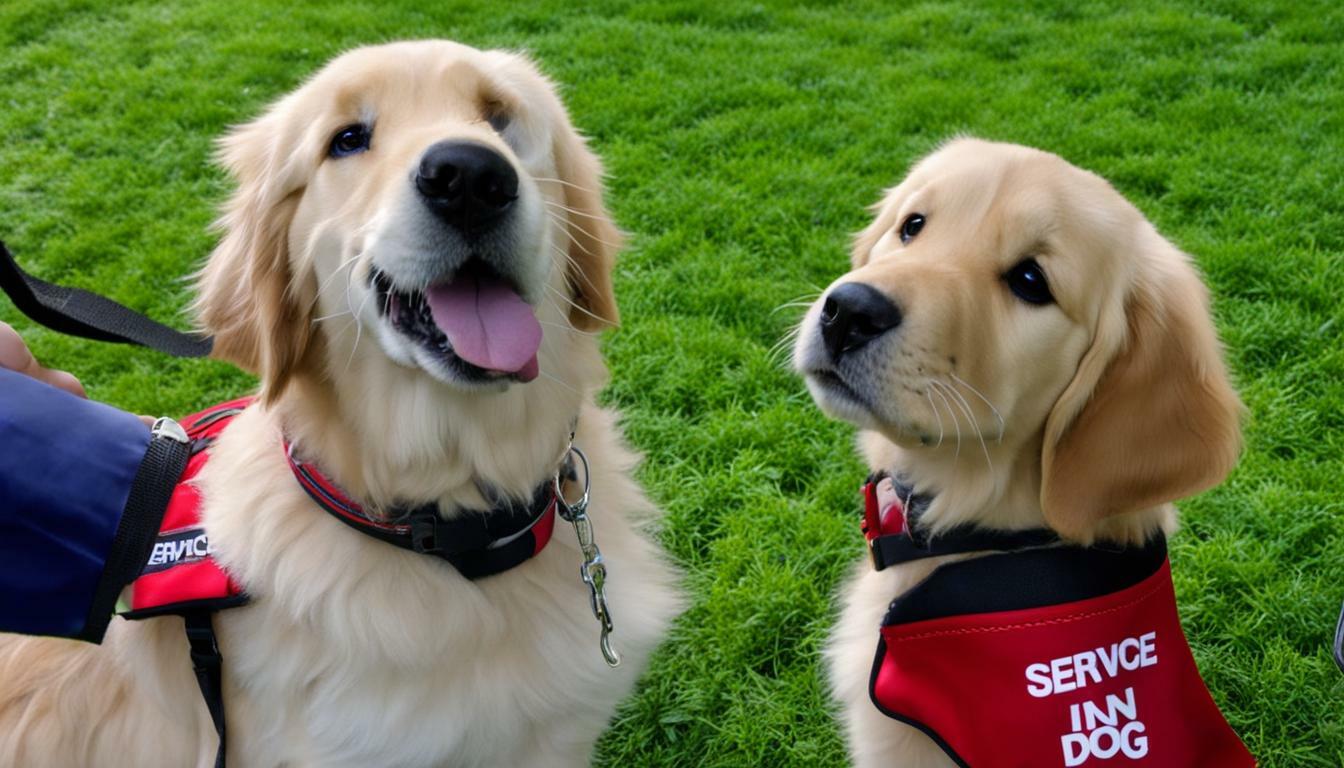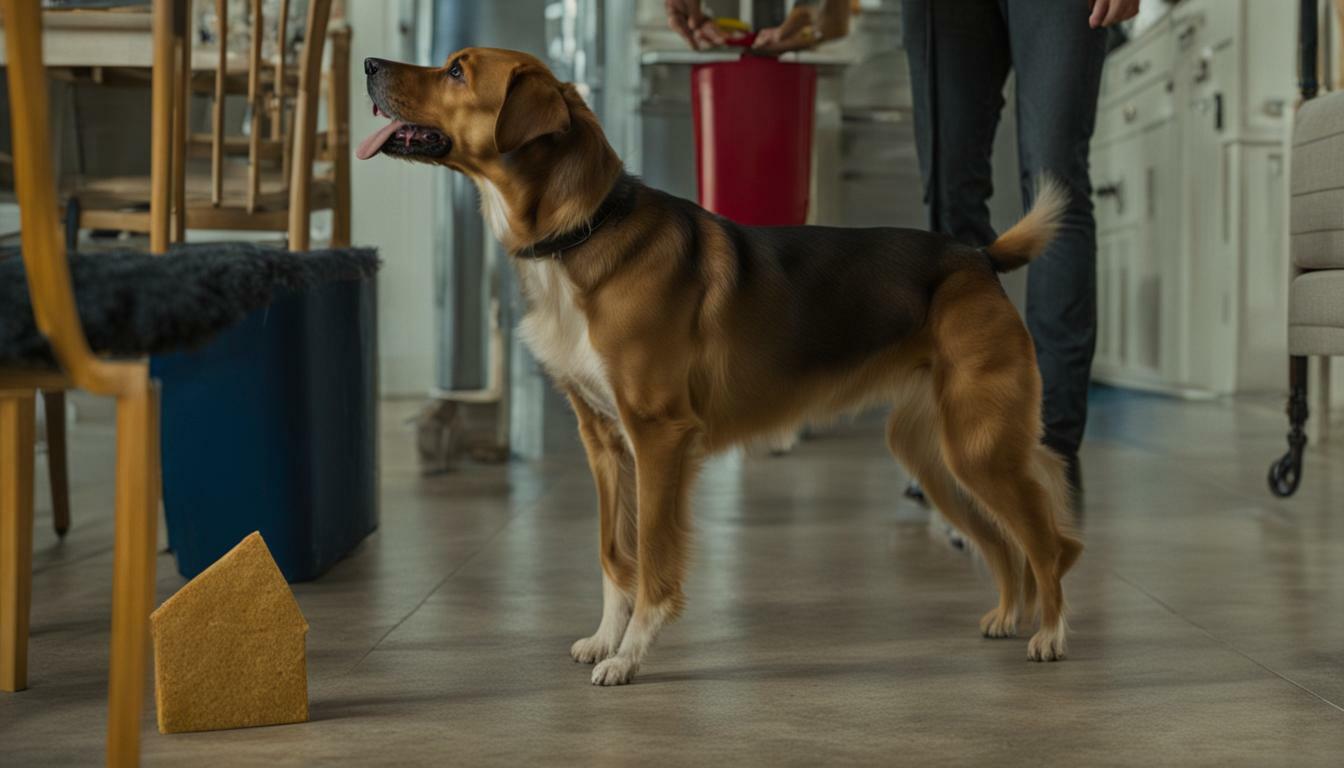If you’re looking to get training for a service dog, this comprehensive guide is here to help. Service dogs provide invaluable support to individuals with disabilities, and proper training is essential to ensure they perform their tasks effectively. Whether you’re seeking service dog training programs, certified trainers, or organizations, we’ve got you covered.
In this guide, we’ll cover everything you need to know about how to get training for a service dog. From understanding the importance of service dogs to identifying the right training program and finding certified trainers, we’ll walk you through the process step by step. We’ll also explore various training methods and certifications, funding options, and strategies for maintaining training progress.
- Getting training for a service dog is essential for individuals with disabilities.
- Service dog training programs, certified trainers, and organizations play a vital role in providing specialized training.
- Choosing the right training program and certified trainer is crucial for the successful training of a service dog.
- Funding options, such as scholarships and grants, can help alleviate the financial burden of service dog training.
- Maintaining training progress through consistency and ongoing education is essential for the effectiveness of the service dog.
Understanding the Importance of Service Dogs
Service dogs play a vital role in assisting individuals with disabilities, performing tasks that make everyday life easier and more independent. But before diving into the training process, it’s essential to understand the requirements associated with their training.
According to the Americans with Disabilities Act (ADA), service dogs must undergo specific training to perform tasks related to their handler’s disability. The training must be task-focused and tailored to the individual’s needs. It’s crucial to ensure that the trainer provides adequate documentation of the training, including the tasks taught and the handler’s ability to maintain control of the dog.
When seeking service dog training near you, it’s essential to research trainers with experience training dogs for your specific disability. Some trainers specialize in training service dogs for mobility assistance, while others may focus on training dogs for mental health support. Ensure that the trainer you choose has a good reputation and accreditation from reputable organizations.
Additionally, it’s important to note that service dog training requirements vary depending on the handler’s needs and the specific tasks the dog will perform. Some tasks may require more extensive training, such as alerting to seizures or detecting changes in blood sugar levels. It’s crucial to work with a qualified trainer who understands the unique needs of your disability and can train your service dog accordingly.
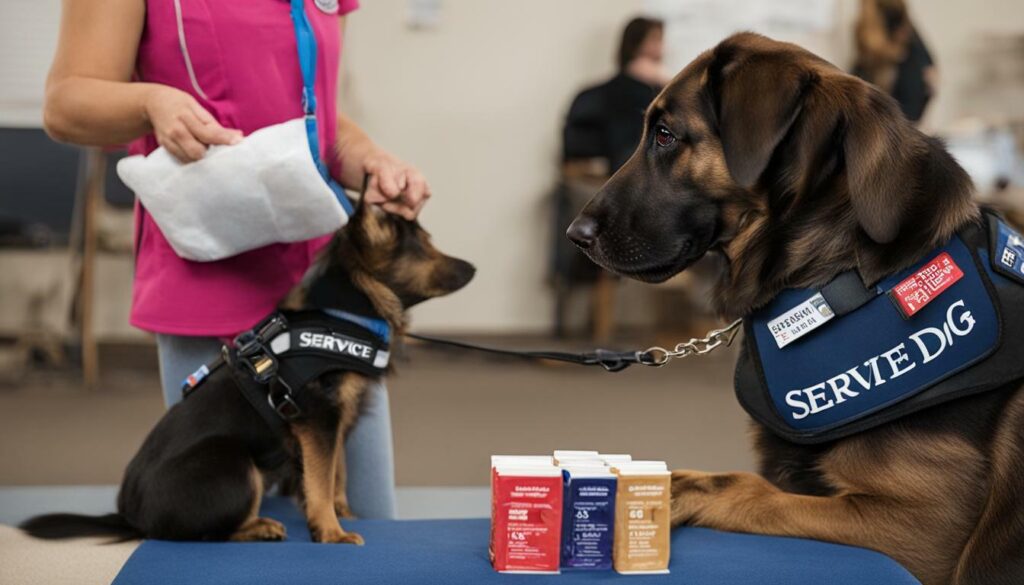
Understanding the importance of service dogs and the requirements associated with their training is crucial to ensure the successful and effective training of your service dog. In the following sections, we’ll explore how to identify the right service dog training program, find certified trainers, and evaluate different training methods to ensure that your service dog receives the best training possible.
Identifying the Right Service Dog Training Program
Choosing the appropriate service dog training program is crucial for ensuring the successful training of your service dog. It is essential to consider various factors while selecting a training program that best suits your needs.
One of the first things to consider when selecting a program is its curriculum. A good service dog training program should cover all the fundamental aspects of service dog training, including obedience training, task-based training, public access training, and more. It should also offer flexibility in training methods and tailor the training program to the specific needs of your service dog and their role.
Another factor to consider while selecting a program is the reputation and experience of the trainers. Look for a program that has certified service dog trainers with a proven track record of training successful service dogs. The trainers should possess extensive knowledge and experience in training service dogs from different breeds and backgrounds.
It is also essential to consider the accreditation of the training program. Accreditation from a recognized organization ensures that the training program meets certain standards of quality and excellence. It also ensures that the program adheres to ethical practices and provides education that aligns with current service dog training standards.
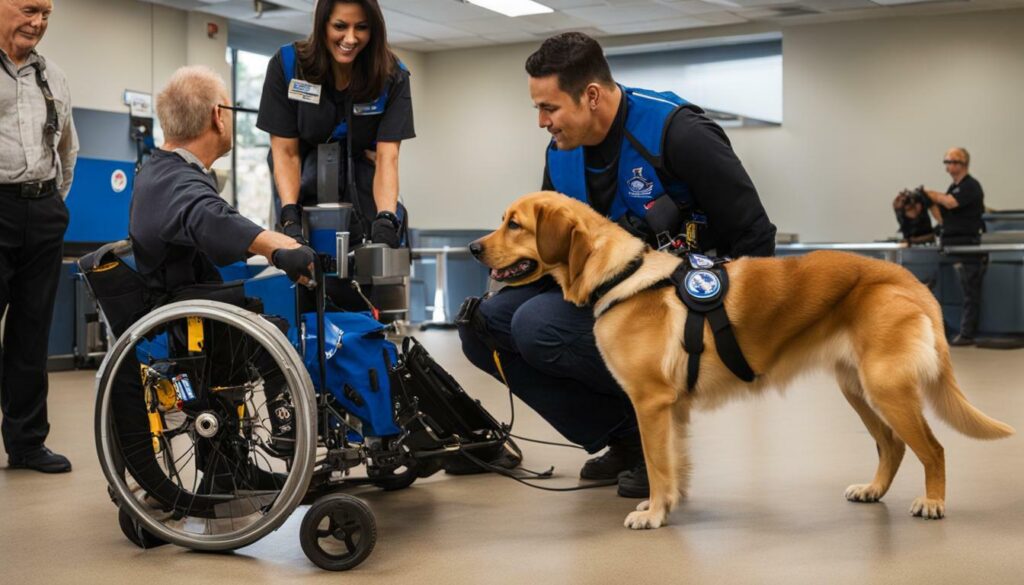
Once you have considered these factors, you can start researching service dog training programs near you. You can find programs through online directories or search engines. Some training programs may require an application process, so be prepared to provide information about your service dog and their specific training needs.
Overall, selecting the right service dog training program is a crucial step towards ensuring the successful training of your service dog. Consider the program’s curriculum, trainer reputation and experience, and accreditation to make an informed decision that best suits your service dog’s needs.
Finding Certified Service Dog Trainers
When searching for a certified service dog trainer, it is essential to find someone with the necessary expertise and experience in training service dogs. Here are some tips to help you find the right trainer for your service dog:
- Look for trainers who are certified by reputable organizations such as the Certification Council for Professional Dog Trainers or the International Association of Assistance Dog Partners.
- Consider trainers who specialize in training service dogs for your specific disability or task requirements.
- Ask for references and speak with previous clients to gauge the trainer’s effectiveness.
- Ensure that the trainer practices positive reinforcement training methods and does not use aversive techniques.
During the evaluation process, ask the trainer about their training philosophy and techniques. It’s also essential to observe their interactions with your service dog. A reputable trainer will take the time to get to know your service dog and tailor the training program to their specific needs.
Working with a certified service dog trainer can ensure that your service dog receives comprehensive and effective training. With the right trainer, you can be confident in your service dog’s ability to perform the necessary tasks and provide support for your disability.
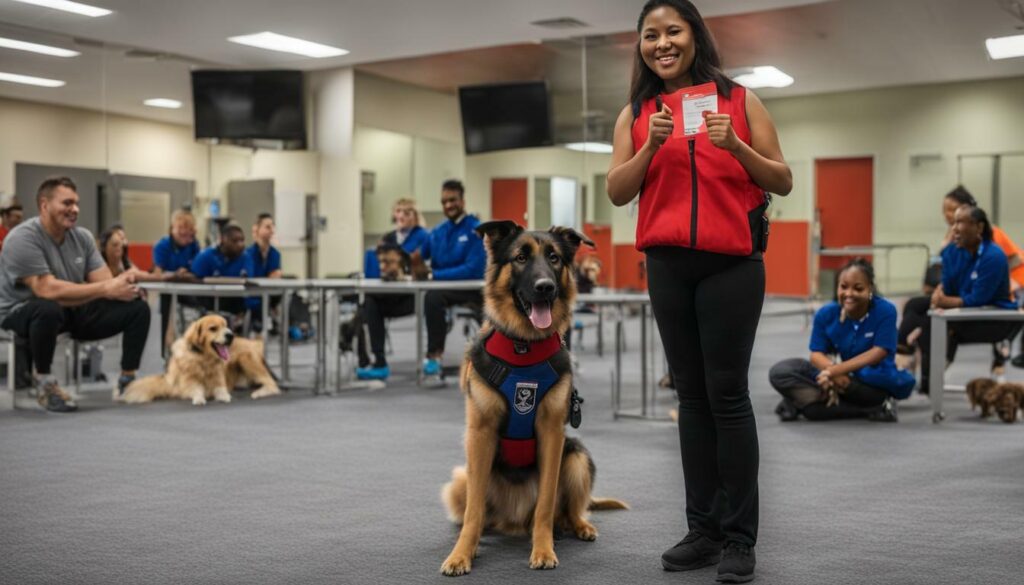
Service dog training organizations are dedicated to providing specialized training for service dogs to assist individuals with disabilities. These organizations play a crucial role in creating a strong, reliable, and effective service dog team.
There are several service dog training organizations operating throughout the United States, offering different programs to meet the specific needs of individuals and their service dogs. Some organizations specialize in training dogs for certain disabilities, such as hearing impairments, while others offer comprehensive training programs for service dogs that work with various disabilities.
When exploring service dog training organizations, there are several factors to consider, such as their reputation, experience, and program curriculum. It’s essential to choose an organization that has certified trainers, proven results, and a high success rate of service dog teams.
One notable service dog training organization is Canine Companions for Independence (CCI). CCI provides comprehensive training programs for service dogs to assist individuals with disabilities like hearing impairments, mobility impairments, and mental health challenges. They also offer ongoing support and resources for service dog teams after completing the training program.
| Benefits of Working with Service Dog Training Organizations |
|---|
| Service dog training organizations provide specialized training programs that cater to specific disabilities, ensuring that the service dog is trained to perform tasks that are specifically tailored to the handler’s needs. |
| Organizations have certified trainers with the necessary expertise and experience to train service dogs effectively and safely. |
| Service dog training organizations provide ongoing support and resources to service dog teams, ensuring the continued success of the service dog-handler partnership. |
Working with a service dog training organization can greatly benefit individuals with disabilities looking to train their service dogs. These organizations provide not only specialized training but also support and resources to ensure the success of the service dog-handler team.
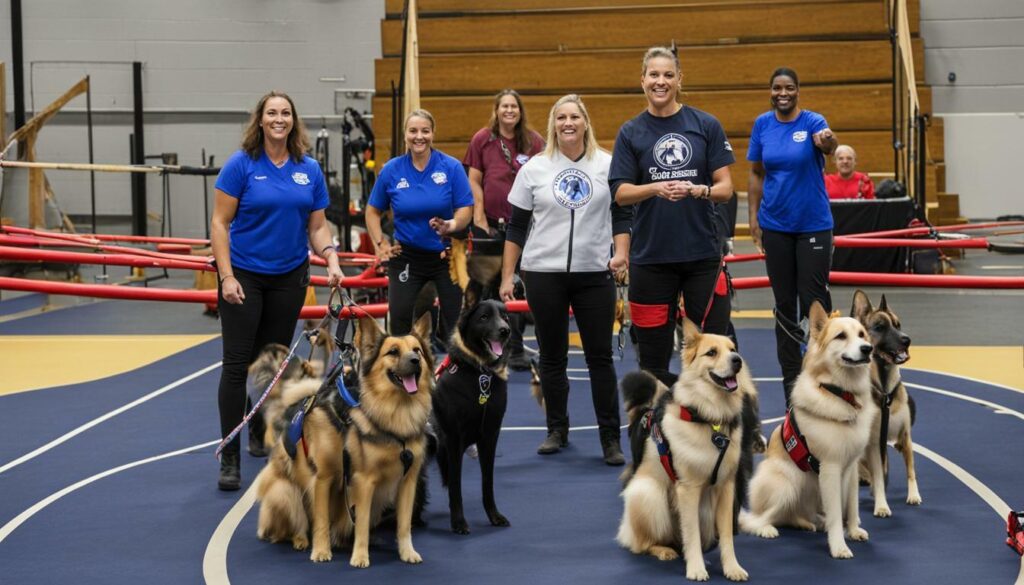
Overall, when considering where to get training for your service dog, exploring service dog training organizations is an excellent option to ensure comprehensive and specialized training for your service dog.
Understanding Service Dog Training Requirements
Service dog training requirements depend on the tasks and roles they will perform. In general, service dogs undergo extensive training to perform specific tasks that assist individuals with disabilities. There are no set standards for service dog training requirements, but organizations such as Assistance Dogs International and International Association of Assistance Dog Partners have established guidelines for training and certification.
Service dog training should cover obedience, socialization, and task-specific training. Obedience training teaches the dog to obey commands, such as sit, stay, come, and heel. Socialization training helps the dog adapt to different environments and interact with people, animals, and objects calmly. Task-specific training focuses on the specific tasks the dog will perform for their handler.
Service dogs must undergo training from a young age to effectively learn and perform tasks. Basic obedience training typically begins at 8-12 weeks of age, followed by more advanced training, including socialization, and task-specific training, as they mature.
It’s essential to work with a certified trainer who understands the training requirements for service dogs. The trainer should have experience in training service dogs and follow ethical training practices. Additionally, certification for both the dog and handler may be required to access certain public spaces, such as airplanes or restaurants.
Overall, service dog training requirements vary based on the tasks they will perform and the organization providing certification. It’s important to research and work with trusted organizations and trainers to ensure that your service dog receives proper training and certification.
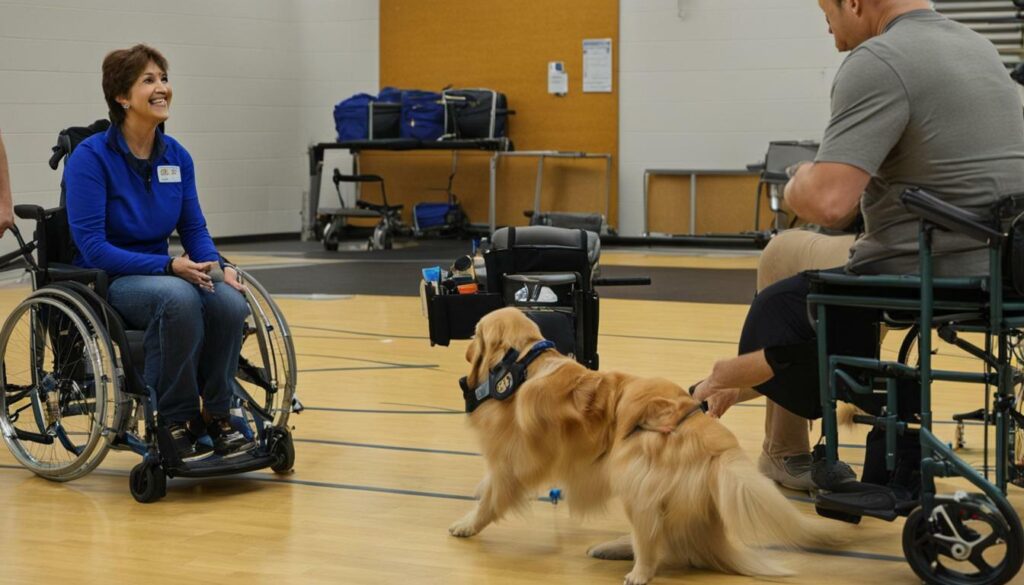
Service dog training classes provide a structured learning environment for both dogs and handlers. These classes are an excellent opportunity to socialize your service dog, learn new training techniques, and reinforce learned behaviors.
When looking for service dog training classes, consider the location, price, and the trainer’s experience and credentials. It is essential to choose a trainer who is knowledgeable about service dog training and has experience working with dogs with different disabilities and needs.
Many organizations offer service dog training classes, such as local animal shelters, dog training schools, and pet stores. These classes typically offer a curriculum that is tailored to the specific needs of service dogs, such as obedience training, public access training, and task training.
It is also essential to consider the size and age of your service dog when choosing a training class. Large service dogs may require a larger training space, while older dogs may require a slower pace of training.
Attending service dog training classes is an excellent way to build a strong bond between you and your service dog while also receiving comprehensive training. With consistent attendance and dedication, you and your service dog will be well on your way to becoming a successful team.
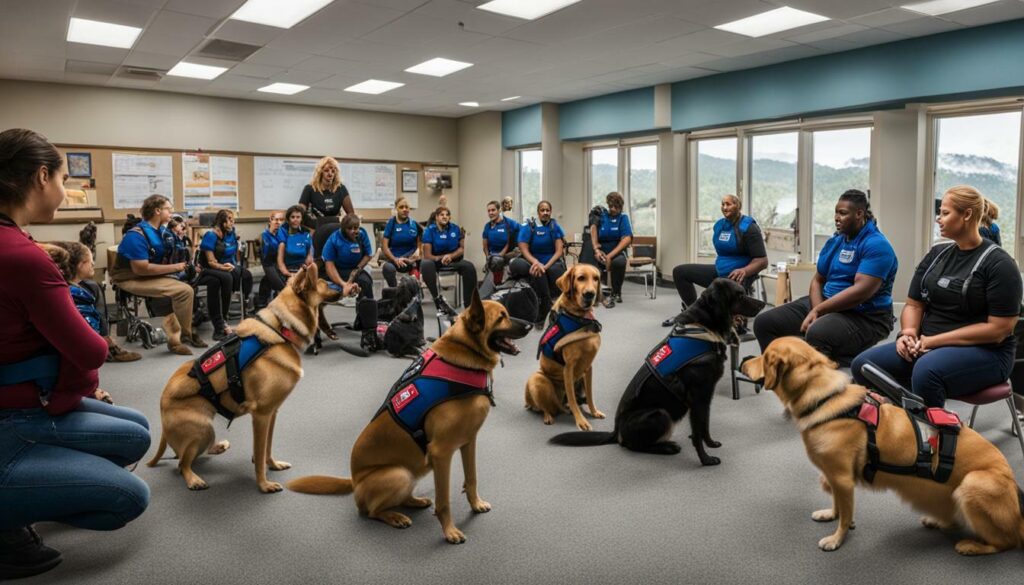
Whether you’re a first-time service dog handler or have been working with service dogs for years, enrolling in service dog training classes can benefit both you and your dog tremendously.
Considering Service Dog Training Schools
Attending a service dog training school is a great option for those who want comprehensive training programs that cover all aspects of service dog training. Professional instructors will teach your service dog obedience, task training, and socialization techniques. You’ll also receive extensive training on how to work with your service dog and maintain their training progress.
When searching for a service dog training school, make sure to consider the school’s reputation, curriculum, and accreditation. Look for schools that specialize in service dog training and have a proven track record of successful training programs.
It’s also important to evaluate the training methods used by the school. Positive reinforcement training is the most widely practiced service dog training method and has proven to be highly effective. However, some schools may use aversive methods, such as shock collars, that can harm your service dog and hinder their training progress.
| Pros | Cons |
|---|---|
| Comprehensive training programs | Higher cost compared to individual trainers |
| Professional instructors with extensive experience | May not be located near you |
| Opportunity for socialization with other dogs | Limited individual attention for each dog |
Attending a service dog training school can be a significant investment, but it can also provide invaluable benefits for you and your service dog. If you’re considering this option, make sure to research thoroughly and choose a reputable school that meets your needs.
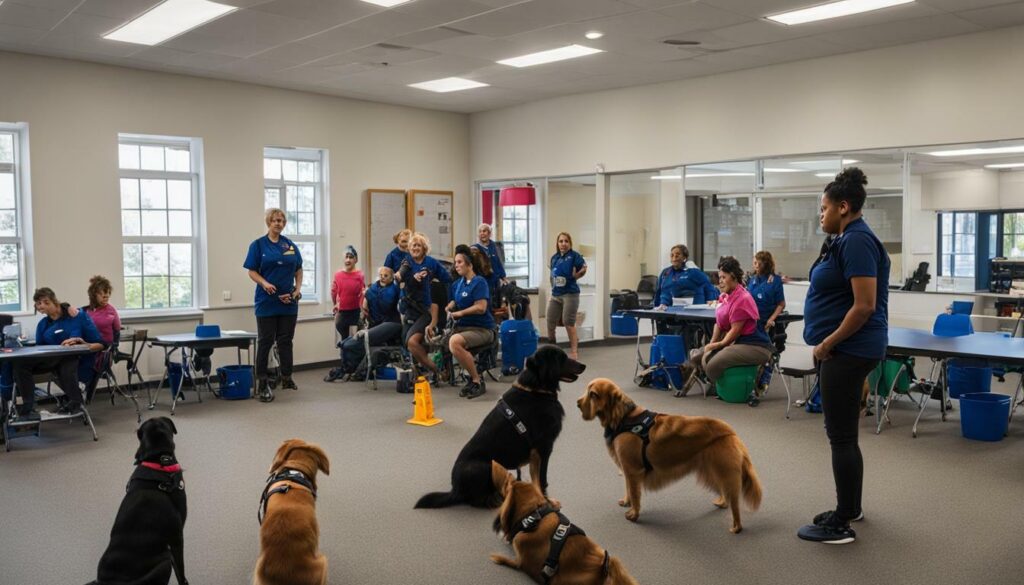
There are various service dog training methods available, each with its own advantages and considerations. When selecting a training method, it’s important to take into account the specific needs and abilities of the dog, as well as the handler’s preferences and lifestyle. Here are some commonly used service dog training methods:
Positive Reinforcement:
This method focuses on rewarding desired behaviors with treats, praise, or other positive reinforcements. Positive reinforcement builds a dog’s confidence and trust, and it’s a gentle and effective way to encourage good behavior. However, it may not be appropriate for dogs who are highly food-motivated or have health issues that require monitoring their diet.
Clicker Training:
Clicker training involves using a clicker to mark desired behaviors, followed by a reward. This method is effective for shaping specific behaviors and can be helpful for dogs with hearing impairments. However, it requires a certain level of coordination and timing from the handler and may not be suitable for dogs who are sensitive to loud sounds.
Task-Focused Training:
This method emphasizes teaching dogs specific tasks and behaviors associated with their service role. Task-focused training is highly individualized and requires a thorough understanding of the dog’s particular needs and abilities. While it may be effective for dogs who have a clear service role, it may not be suitable for dogs who require a more general skillset.
It’s important to note that service dog training methods should never involve negative reinforcement or punishment, as this can cause harm to the dog and compromise their training progress. Ultimately, the best approach to service dog training will depend on the unique needs and circumstances of the dog and handler.
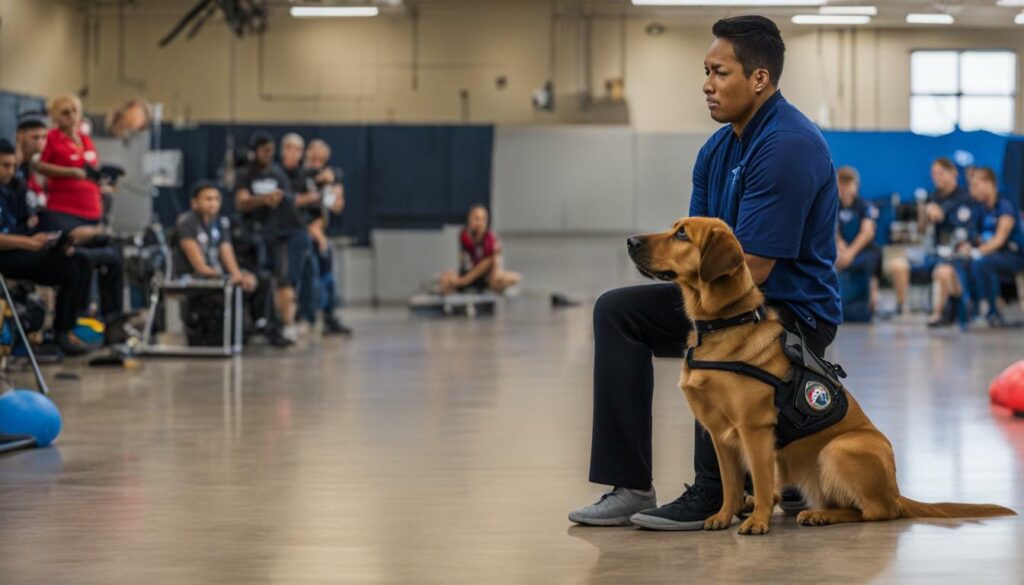
Service dogs play a critical role in improving the lives of veterans dealing with physical and mental health issues. Training a service dog for veterans requires specialized training programs that address the unique needs of this community.
Service dogs for veterans can provide physical assistance, such as mobility support or retrieving objects, as well as emotional support for conditions such as PTSD or anxiety.
A crucial factor in service dog training for veterans is selecting a dog with a suitable temperament and size to meet the veteran’s specific needs. The dog must also possess the necessary skills and behaviors to perform the required tasks.
Training programs for service dogs for veterans focus on socialization, obedience training, and task-specific training. Socialization is essential to acclimate the dog to public environments and reduce anxiety. Obedience training teaches the dog fundamental commands and behavioral expectations. Task-specific training helps the dog develop the skills and behaviors necessary to perform specific tasks and support the veteran.
Veterans can also benefit from group training sessions that provide opportunities to interact with other veterans and handlers and foster a sense of community.
Service dog training for veterans should not only focus on the dog’s training but also on supporting the veteran’s well-being. Training programs should include education and resources on managing the dog’s care and addressing the veteran’s emotional and mental health needs.
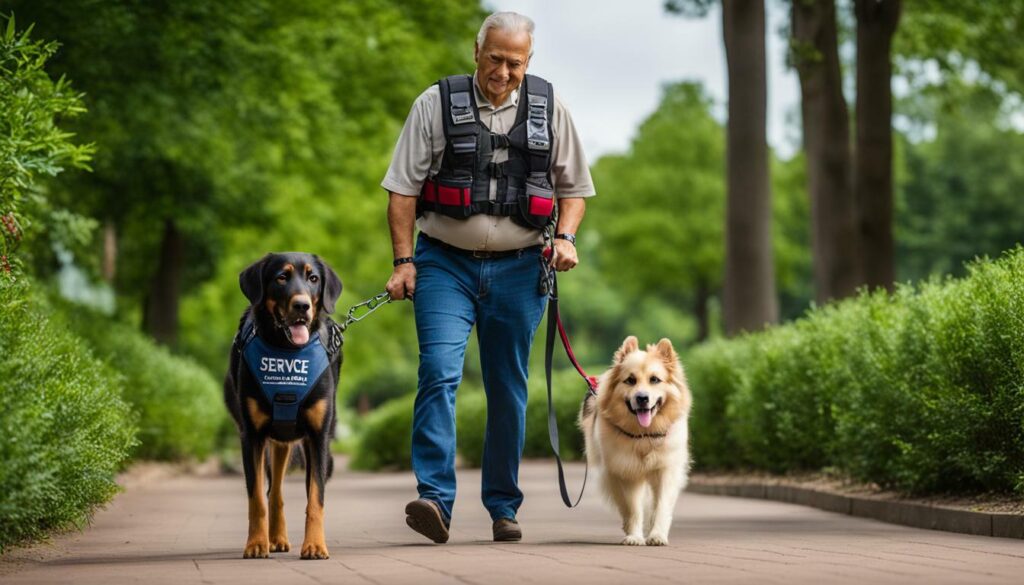
Overall, training a service dog for veterans requires specialized programs that address the unique needs of veterans dealing with mental and physical health issues.
Obtaining Service Dog Training Certifications
If you want to validate your service dog’s training and expertise, obtaining a service dog training certification is a great way to do so. Certifications can also lend credibility to your dog, which can be particularly important if you are using them in professional settings.
Several organizations offer service dog training certifications, and each has different requirements and processes. The International Association of Assistance Dog Partners (IAADP) is one such organization that offers a certification program for service dogs. The IAADP certification is recognized internationally and requires your dog to complete specific training in obedience and public access.
Another widely recognized certification is the Assistance Dogs International certification. This certification program requires that the dog and handler pass a public access test and meet specific standards for obedience, task training, and behavior.
It’s essential to research and evaluate each certification program to determine which one best suits your needs and the needs of your service dog. Some programs may be more geared towards specific types of service dogs or disabilities, so be sure to consider this when making your decision.
Also, keep in mind that no certification is required by law, but having one can help ensure that your service dog is accepted in public spaces and can help protect your rights as a service dog handler. Additionally, some organizations or establishments may require a certification before allowing your service dog on their premises.
Overall, obtaining a service dog training certification can be an excellent way to validate your service dog’s training and enhance their credibility. Be sure to research and evaluate different certification programs to choose the one that best suits your needs and your service dog’s needs.
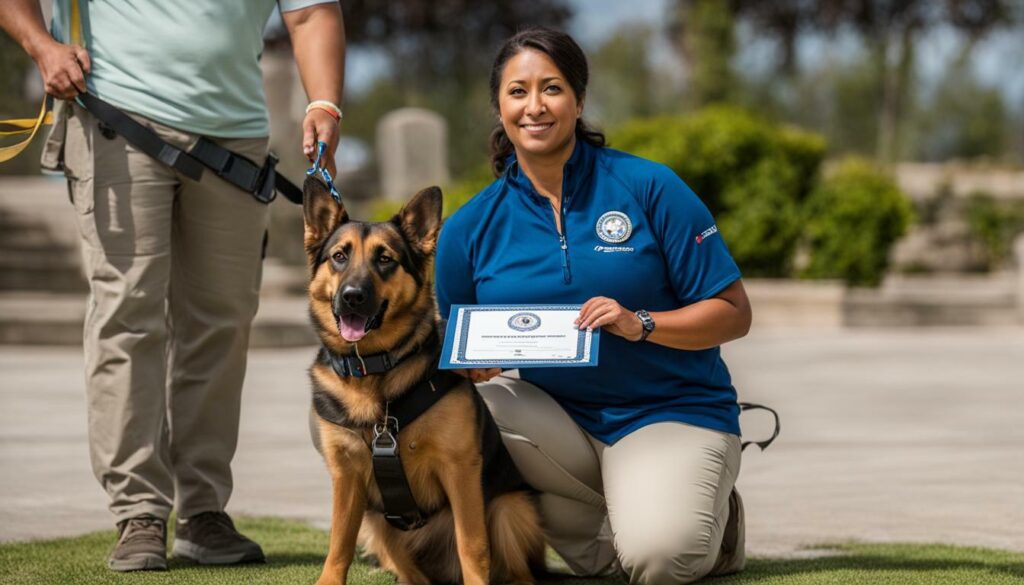
Training a service dog can be an expensive endeavor, with the cost of training programs, certifications, and ongoing education. However, there are funding options available to help offset these costs.
One option for funding service dog training is through grants. There are numerous organizations that offer grants specifically for service dog training, such as the Working Dogs for Vets Foundation and the AKC Canine Health Foundation. These organizations may have specific requirements or criteria for grant eligibility, so be sure to research thoroughly before applying.
Scholarships are another option for funding service dog training. Organizations such as Paws with a Cause and the Grey Muzzle Organization offer scholarships to individuals who need financial assistance for service dog training.
Crowdfunding is also a viable option for funding service dog training. Websites like GoFundMe and Kickstarter enable individuals to create fundraising campaigns to support their service dog training efforts. Sharing your campaign on social media and other online platforms can help increase its visibility and reach a larger audience.
It’s essential to research funding options thoroughly before committing to one. Some may have specific requirements or eligibility criteria, so be sure to read the fine print carefully. Additionally, it’s vital to remain transparent and communicative throughout the fundraising process, providing updates and expressing gratitude to donors and supporters.

Socialization is critical to the success of any service dog training program. A well-socialized service dog can adapt to various environments, interact appropriately with people and animals, and remain calm and focused in stressful situations. Here are some tips for socializing your service dog during training:
- Start Early: Begin socializing your service dog as early as possible. Early exposure to different people, environments, and sounds can help your dog develop a confident and adaptable personality.
- Introduce Different Situations: Expose your dog to various situations, such as crowded streets, public transportation, and busy restaurants. Gradually increase the level of difficulty as your dog becomes more comfortable.
- Positive Reinforcement: Use positive reinforcement techniques, such as treats and praise, to encourage your dog’s good behavior during socialization experiences.
- Exposure to Other Animals: It’s essential to socialize your service dog with other animals, such as other dogs, cats, and even farm animals, to help them learn appropriate social skills.
- Work with a Professional: Consider enrolling your service dog in group socialization classes or working with a professional dog trainer to ensure they receive proper socialization and training.
Remember that socialization is an ongoing process throughout your service dog’s training and life. Continuously expose them to different environments and situations while reinforcing positive behavior to maintain their socialization progress.
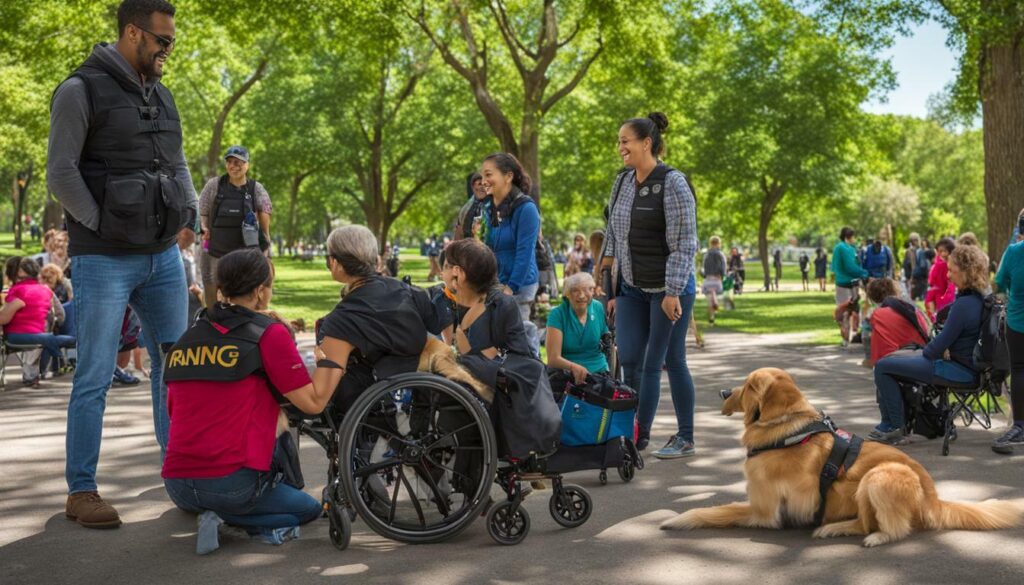
Consistency and ongoing training are crucial for maintaining the progress that your service dog has made during their training. Here are some tips to help you reinforce learned behaviors, address challenges, and continue education for you and your service dog.
1. Reinforce Learned Behaviors
Ingraining the behaviors that your service dog has learned is vital to maintaining their progress. Incorporate daily practice sessions to reinforce the learned behaviors consistently.
During these sessions, focus on the skills that your service dog needs to perform their job effectively. Incorporate commands and tasks that your dog already knows and then gradually work up to more complex skills. Ensure that you are providing consistent positive reinforcement, whether through verbal cues or treats.
2. Address Challenges
During the training process, your service dog may face challenges that make it difficult for them to perform their duties effectively. It’s essential to identify these challenges and address them immediately to prevent any regressions in progress.
For example, if your service dog is struggling with a particular skill, take a step back and reevaluate your training approach. You may need to break the skill down into smaller, more manageable steps to help your service dog master it.
3. Continue Education
Service dog training is an ongoing process that requires continuous education and learning. Stay up-to-date on current service dog training practices, attend workshops or conferences, and connect with other service dog handlers to exchange ideas and experiences.
Continual education can help you address any challenges that arise during the training process and stay informed on new or more effective training approaches.
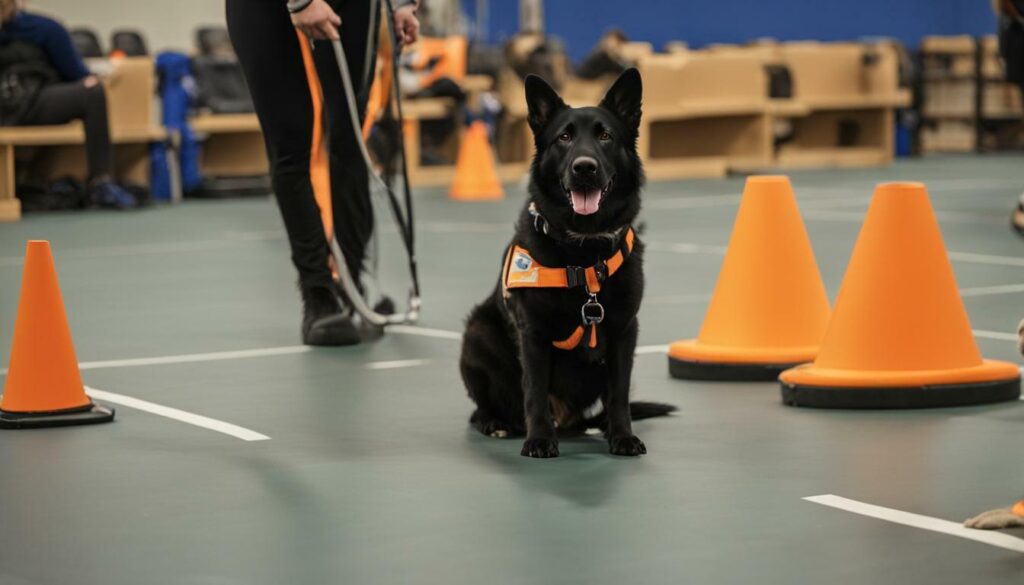
Remember that maintaining the progress of your service dog’s training is just as important as the initial training process. Consistency, addressing challenges, and continuing education are all vital aspects of maintaining the progress that your service dog has made. By implementing these tips and regularly practicing learned behaviors, you can ensure that your service dog is consistently performing their job to the best of their abilities.
Conclusion
In summary, getting proper training for a service dog is essential for their effectiveness in assisting individuals with disabilities. There are various steps involved in the process, such as identifying the right training program, finding certified trainers, understanding training requirements, and considering funding options. It’s also essential to socialize your service dog during training and maintain consistent progress after completing the training program.
The benefits of investing time, effort, and resources in training a service dog are numerous. A well-trained service dog can provide invaluable support, enhance independence, and improve overall quality of life for their handlers.
By following the steps and resources outlined in this guide, you’ll be well on your way to getting the proper training for your service dog. Remember always to prioritize their training needs and seek professional help when necessary to ensure their success in their important role.
Thank you for reading our guide on how to get training for a service dog.
FAQ
What is the importance of service dogs?
Service dogs play a crucial role in assisting individuals with disabilities and performing specific tasks to enhance their independence and quality of life.
How can I find service dog training programs near my location?
You can search online directories, contact local organizations specializing in service dog training, or ask for recommendations from veterinarians and disability support groups.
What factors should I consider when choosing a service dog training program?
It is important to consider the program’s curriculum, reputation, accreditation, and the specific training methods employed.
How can I find certified service dog trainers?
You can search for certified service dog trainers through professional organizations, contact local training schools and organizations, or ask for recommendations from veterinarians and other service dog owners.
What are the benefits of working with service dog training organizations?
Service dog training organizations specialize in providing comprehensive training programs and support. They often have experience working with a variety of disabilities and can offer valuable resources and guidance.
What are the common training requirements for service dogs?
The training requirements for service dogs can vary depending on the tasks they will perform. However, common training requirements include obedience training, task-specific training, and socialization.
What are the benefits of enrolling in service dog training classes?
Enrolling in service dog training classes provides a structured learning environment, socialization opportunities, and guidance from experienced trainers.
What should I consider when choosing a service dog training school?
When choosing a service dog training school, consider factors such as the school’s reputation, curriculum, training methods, and the support they offer to handlers during and after training.
What are some different service dog training methods?
Common service dog training methods include positive reinforcement, clicker training, and task-focused training. Each method has its advantages and considerations, so it’s important to choose one that aligns with your training goals and your dog’s needs.
What are the specific training considerations for service dogs for veterans?
Training a service dog for veterans may involve addressing specific challenges related to post-traumatic stress disorder (PTSD) or physical disabilities. It is important to consider these unique needs during training.
What certifications are available for service dog training?
Various certification options exist for service dog training, including certifications offered by professional organizations and programs that evaluate a dog’s skills and abilities.
How can I fund service dog training?
You can explore funding options such as grants, scholarships, and crowdfunding platforms specifically designed to support service dog training.
What are effective strategies for socializing a service dog in training?
Effective strategies for socializing a service dog in training include gradual exposure to different environments, positive reinforcement, and controlled interactions with people and other animals.
How can I maintain the training progress of a service dog?
Maintaining training progress involves consistent practice, reinforcing learned behaviors, addressing challenges promptly, and providing continuing education opportunities for both the dog and the handler.

Marissa Delotta, 36, from Dayton, Ohio, is the creative force behind Roverboard.com, a beloved online destination for dog lovers. As a dedicated mom and canine enthusiast, Marissa combines her family experiences with her love for dogs to offer a platform where dog owners can exchange tips, heartwarming stories, and advice. Her website has become a vibrant community for sharing the joys of dog parenting. In her free time, Marissa enjoys exploring dog parks with her family and volunteering at local animal shelters.

